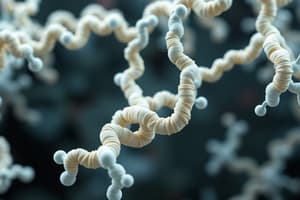Podcast
Questions and Answers
What role do codons play in the genetic code?
What role do codons play in the genetic code?
- They act as enzymes during protein synthesis.
- They specify which amino acids correspond to the nucleotide triplets. (correct)
- They initiate the transcription process in the nucleus.
- They provide structural support to the RNA.
How many possible reading frames does an RNA molecule have for translation?
How many possible reading frames does an RNA molecule have for translation?
- One
- Four
- Three (correct)
- Two
What is the primary function of polyribosomes in protein synthesis?
What is the primary function of polyribosomes in protein synthesis?
- They enhance the stability of mRNA.
- They produce multiple copies of proteins from a single mRNA. (correct)
- They facilitate the unwinding of DNA.
- They sequence the amino acids in proteins.
What determines the characteristic properties of each amino acid?
What determines the characteristic properties of each amino acid?
Which description correctly details the genetic code?
Which description correctly details the genetic code?
What is the approximate molecular mass of each amino acid?
What is the approximate molecular mass of each amino acid?
Which of the following is NOT a component of an amino acid's structure?
Which of the following is NOT a component of an amino acid's structure?
What configuration do all standard amino acids derived from proteins have?
What configuration do all standard amino acids derived from proteins have?
What is the primary structure of a protein determined by?
What is the primary structure of a protein determined by?
Which of the following correctly identifies a function of proteins?
Which of the following correctly identifies a function of proteins?
What structural level of protein organization involves interactions between two or more polypeptide chains?
What structural level of protein organization involves interactions between two or more polypeptide chains?
Which component is directly responsible for the translation of RNA into protein?
Which component is directly responsible for the translation of RNA into protein?
What type of modification can proteins undergo after translation?
What type of modification can proteins undergo after translation?
What is the role of hemoglobin in the body?
What is the role of hemoglobin in the body?
How many hierarchical structures do proteins have?
How many hierarchical structures do proteins have?
Which of the following statements about the central dogma of molecular biology is true?
Which of the following statements about the central dogma of molecular biology is true?
Which property of proteins is crucial for their specific functions?
Which property of proteins is crucial for their specific functions?
Which feature does the tertiary structure of a protein depend on?
Which feature does the tertiary structure of a protein depend on?
Which of the following amino acids has a side chain that contains an imidazole group?
Which of the following amino acids has a side chain that contains an imidazole group?
What type of reaction covalently links amino acids together to form a peptide bond?
What type of reaction covalently links amino acids together to form a peptide bond?
If a protein has a pI of 6 and the pH of the solution is 5, what is the net charge of the protein?
If a protein has a pI of 6 and the pH of the solution is 5, what is the net charge of the protein?
Which of the following amino acids is classified as aromatic?
Which of the following amino acids is classified as aromatic?
Which group of amino acids is characterized by containing sulfur?
Which group of amino acids is characterized by containing sulfur?
What does the term 'oligomeric proteins' refer to in the context of allostery?
What does the term 'oligomeric proteins' refer to in the context of allostery?
Which amino acid is known to be the smallest by size?
Which amino acid is known to be the smallest by size?
Which of these amino acids contains a carboxyl group in its side chain?
Which of these amino acids contains a carboxyl group in its side chain?
What best describes the significance of the Fab and Fc regions in antibodies?
What best describes the significance of the Fab and Fc regions in antibodies?
Which amino acid is characterized by being found in turns of protein structures?
Which amino acid is characterized by being found in turns of protein structures?
Flashcards
Protein
Protein
A molecule composed of one or more chains of amino acids, performing a specific function in the cell, often translated from RNA.
Amino Acid
Amino Acid
The building blocks of proteins, linked together by peptide bonds.
Protein Folding
Protein Folding
The process by which a linear polypeptide chain assumes its three-dimensional structure.
Primary Structure
Primary Structure
The linear sequence of amino acids in a protein.
Signup and view all the flashcards
Secondary Structure
Secondary Structure
Local folded structures within a protein, such as alpha-helices or beta-sheets, resulting from interactions between amino acids.
Signup and view all the flashcards
Tertiary Structure
Tertiary Structure
The overall three-dimensional shape of a single polypeptide chain, resulting from interactions between secondary structures.
Signup and view all the flashcards
Quaternary Structure
Quaternary Structure
The arrangement of multiple polypeptide chains in a protein.
Signup and view all the flashcards
Central Dogma
Central Dogma
The flow of genetic information within a biological system, from DNA to RNA to protein.
Signup and view all the flashcards
Transcription
Transcription
The process of converting information from DNA to RNA.
Signup and view all the flashcards
Post-translational modification
Post-translational modification
Chemical changes to proteins after translation, affecting their function.
Signup and view all the flashcards
Translation
Translation
The process of converting information from RNA into protein.
Signup and view all the flashcards
Genetic Code
Genetic Code
A set of rules that connects RNA nucleotide triplets (codons) to amino acids in proteins.
Signup and view all the flashcards
Codon
Codon
A three-nucleotide sequence in RNA that specifies a particular amino acid.
Signup and view all the flashcards
Reading Frame
Reading Frame
The way a sequence of nucleotides in mRNA is divided into successive sets of three nucleotides to be translated into protein.
Signup and view all the flashcards
Amino Acid
Amino Acid
The building block of proteins. Each has an amine group, a carboxyl group, and a unique side chain.
Signup and view all the flashcards
Polyribosome (polysome)
Polyribosome (polysome)
A complex of several ribosomes that translate a single mRNA molecule simultaneously.
Signup and view all the flashcards
Standard Amino Acids
Standard Amino Acids
There are 20 fundamental amino acids used to build proteins.
Signup and view all the flashcards
L-Amino Acid
L-Amino Acid
Type of amino acid with a specific 3D configuration used in creating protein.
Signup and view all the flashcards
Amino Acid Classes
Amino Acid Classes
Amino acids are categorized by their side chain (R group) properties, including aromatic, amino-containing, carboxyl-containing, hydroxyl-containing, and thiol-containing.
Signup and view all the flashcards
Peptide Bond
Peptide Bond
A covalent bond formed between the carboxyl group of one amino acid and the amino group of another, linking amino acids together in a polypeptide chain.
Signup and view all the flashcards
Polypeptide Formation
Polypeptide Formation
A long chain of amino acids linked by peptide bonds, forming a protein.
Signup and view all the flashcards
pI (Isoelectric Point)
pI (Isoelectric Point)
The pH at which an amino acid or protein carries no net electrical charge.
Signup and view all the flashcards
Henderson-Hasselbalch Equation
Henderson-Hasselbalch Equation
An equation relating pH, pKa, and the concentrations of an acid and its conjugate base.
Signup and view all the flashcards
Antibody Structure
Antibody Structure
An antibody, like IgG, consists of four polypeptide chains (two heavy and two light chains) with a specific binding region (Fab/Fv) for antigens and a constant region (Fc).
Signup and view all the flashcards
Allosteric Effect
Allosteric Effect
A change in the binding affinity of a protein for its ligand due to binding at a different site on the protein.
Signup and view all the flashcards
Alpha-helices
Alpha-helices
A common secondary structure in proteins, formed by a coiled chain.
Signup and view all the flashcards
Smallest amino acid
Smallest amino acid
Glycine (Gly) and Alanine (Ala) are the smallest amino acids, with Glycine being the smallest.
Signup and view all the flashcards
Peptide Chain Directionality
Peptide Chain Directionality
The direction of polypeptide chains is N-terminus to C-terminus.
Signup and view all the flashcardsStudy Notes
Protein Structure and Function
- Proteins are the building blocks of life, composed of one or more chains of amino acids.
- Proteins perform diverse functions, including: catalyzing reactions (enzymes), providing support (structural proteins), carrying molecules (transport proteins), storing molecules, signaling, and having a special purpose.
- Proteins have 4 levels of structure:
- Primary: The linear sequence of amino acids.
- Secondary: Interactions between close amino acids forming alpha helices and beta sheets.
- Tertiary: Interactions between secondary structures and distant amino acids creating a 3D shape.
- Quaternary: Interactions between multiple polypeptide chains to create a larger complex structure.
- Protein structure is vital for function. Correct folding is necessary for proper activity.
- Protein folding is influenced by hydrophobic core collapse, energy-entropy, and chaperone proteins.
- Misfolded proteins can result in various diseases.
Central Dogma
- Genetic information flows from DNA to RNA to protein.
- DNA is transcribed into RNA, which is then translated into protein.
- RNA carries the genetic information from the DNA in the nucleus to the ribosomes in the cytoplasm, where proteins are synthesized.
- Many copies of RNA can be made from one gene, enabling the rapid synthesis of a protein.
Translation
- Translation is the conversion of genetic information in RNA to protein.
- The genetic code specifies the correspondence between nucleotide triplets (codons) in DNA or RNA and amino acids in proteins.
- A codon is a group of three consecutive nucleotides in RNA, and each codon specifies a single amino acid.
- Reading frames describe how a string of nucleotides is translated into a protein.
Amino Acids
- Amino acids are the building blocks of proteins.
- Each amino acid has a central carbon atom (alpha carbon) bonded to a carboxyl group, an amino group, and a hydrogen atom.
- The side chain (R group) distinguishes each amino acid and gives it its unique characteristic.
- The twenty standard amino acids are linked by peptide bonds to form proteins.
Protein Folding
- Protein folding is crucial to protein function. Improper folding leads to dysfunction or disease.
- The native protein shape (3-D structure) is determined by the sequence of its amino acids.
- The process is described by Anfinsen's dogma.
Protein Parameters
- Protein parameters include:
- Number of amino acid residues
- Number of subunits
- Protein molecular mass (Da or kDa)
- Isoelectric point (pI) -These parameters can be predicted using software.
Allostery
- Allosteric effects describe how the binding of a ligand at one site in an oligomeric protein affects the binding of a ligand at another site.
- Allostery involves a change in protein conformation.
- Allosteric effects are important in many biological processes, including enzyme regulation and oxygen binding to hemoglobin.
Other Relevant Information
- The 20 standard amino acids are further classified according to different properties of their side chains (R-groups).
- Important techniques for determining protein structure include X-ray crystallography and NMR.
- Various methods of reducing disulfide bonds involved in the creation of a protein also exist.
- Additional important information about protein interactions, and special protein classes was also covered, like antibodies.
Studying That Suits You
Use AI to generate personalized quizzes and flashcards to suit your learning preferences.




